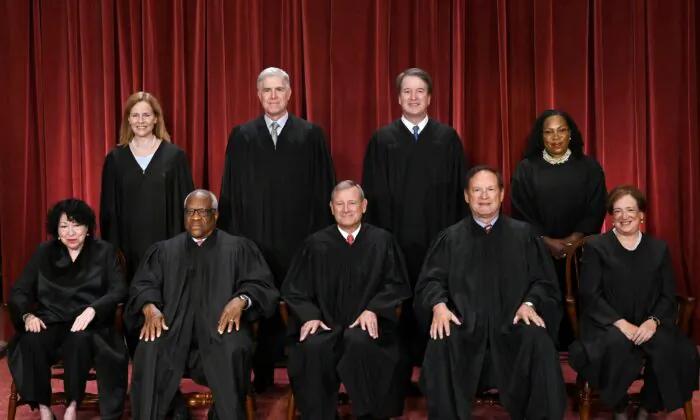
Justices of the US Supreme Court pose for their official photo at the
Supreme Court in Washington on Oct. 7, 2022. (Olivier Douliery/AFP via
Getty Images)
The U.S. Supreme Court on May 17 allowed Illinois’s strict new gun control law to remain in effect, denying an emergency request for an injunction.
It means that the measure, which bans what it calls “assault weapons,” will remain intact while lower courts deliberate the matter. An Illinois gun store owner filed a petition with the high court to block the ban on a range of firearms as well as “large capacity” magazines.
Neither the Supreme Court nor Justice Amy Coney Barrett, who received the emergency request from the gun shop owner, explained why it decided not to issue an injunction; no public dissents were made available.
Currently, the U.S. Court of Appeals for the 7th Circuit is considering the gun store owner’s case against the state. The Chicago-based court hasn’t yet issued a final ruling on the law, although the decision will likely be appealed regardless of the outcome.
In a separate case, a federal judge blocked the gun law. However, the 7th Circuit Court has placed that decision on hold in the meantime.
The 7th Circuit appeals court also has expedited consideration of at least five different cases challenging the Illinois law. Meanwhile, the state Supreme Court is considering a similar lawsuit against the measure.
Earlier this year, the state enacted the “Protect Illinois Communities Act” that bars the purchase, sale, delivery, and manufacture of so-called assault weapons and magazines that hold more than 10 rounds. It specifically named AK-47-style rifles and AR-15-style rifles as “assault weapons” under the law, which also requires those who previously purchased semi-automatic rifles to register their ownership with Illinois State Police.
According to an FAQ of the law, “No, Illinois residents cannot purchase an AR-15 or assault weapon beginning January 11, 2023, unless subject to one of the narrow exemptions.” The FAQ also states that the law bans “a magazine, belt, drum, feed strip, or similar device that has a capacity of, or that can be readily restored or converted to accept, more than 10 rounds of ammunition for long guns and more than 15 rounds of ammunition for handguns; or any combination of parts from which a device described can be assembled.”
Illinois Gov. J.B. Pritzker, a Democrat, signed the bill into law.
“For the past four years, my administration and my colleagues in the State Capitol have been battling the powerful forces of the NRA to enshrine the strongest and most effective gun violence legislation that we possibly can,” he said. “I couldn’t be prouder to say that we got it done. And we will keep fighting—bill by bill, vote by vote, and protest by protest—to ensure that future generations only hear about massacres like Highland Park, Sandy Hook, and Uvalde in their textbooks.”
Legal Challenges
Second Amendment advocate groups have repeatedly criticized the law as unconstitutional, and gun rights activists, including Robert Bevis, a gun store owner in Naperville, filed lawsuits to block the state law as well as a similar local ordinance that was passed in the city of Highland Park. Those laws were sparked following last July’s mass shooting at a Highland Park Fourth of July parade that left multiple people dead.
“The challenged laws ban arms commonly possessed by law-abiding citizens for lawful purposes. Heller’s central holding is that a categorical ban on arms held by law-abiding citizens is unconstitutional,” his lawyers wrote to the 7th Circuit judges last month, referring to a 2008 ruling by the Supreme Court on the landmark District of Columbia v. Heller case, in which the high court found that a District law regulating gun ownership to be unconstitutional.
Contending that Bevis’s constitutional rights were violated, his lawyers added: “One would suppose that the district court would apply the Heller test or, failing that, at least explain why it believed the test is not applicable. The district court did neither. It erred when it simply ignored Heller’s central holding. Nowhere in its opinion does it apply, or even acknowledge, Heller’s holding in this regard.”
In explaining why he wanted to file a legal challenge, Bevis told a local news outlet that he believes the statewide ban violates Americans’ Second Amendment right to keep and bear arms.
“I wake up one morning, I come into work, and find out that they are going to ban assault weapons the following week,” he told a local NBC affiliate earlier this year. “It’s unconstitutional. Our Second Amendment provides us a right to keep and bear arms, and this is taking away.”
Some local gun shop owners have said that the term “assault weapons” is a politicized term. “The term itself—‘assault weapon’—is a made-up term by the gun control people in the late ‘80s when they were trying to conflate semi-automatic rifles with machine guns. It’s a made-up term that has absolutely no meaning,” Dan Eldridge, who owns Maxon Shooters Supplies in Des Plaines, told WTTW-TV.
The guns that were outlawed in the state were described by Eldridge as “semi-automatic, center-fire rifles that accept detachable magazines.” He noted that AR-15-style rifles are popular across the United States and that several million people own such firearms in the state of Illinois alone.
“It’s America’s favorite rifle platform, and it is that because it is highly adaptable to all shapes and sizes of people,” Eldridge said. “Easily accessorized. Built on a standard. Available at a wide variety of price points and features. It really is a ‘modern sporting rifle,’ as the industry likes to call it.”
No comments:
Post a Comment